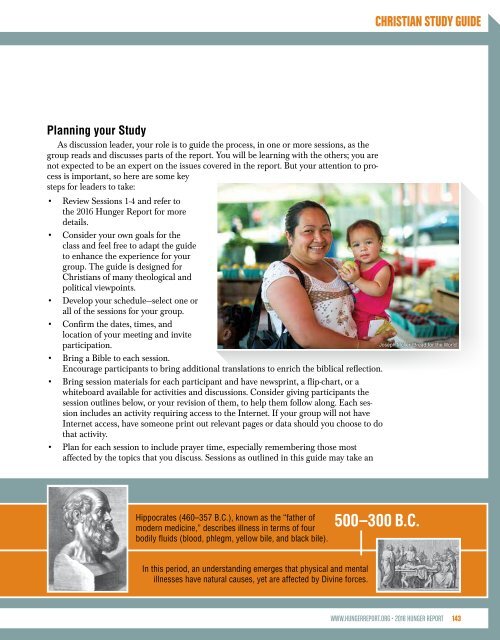THE NOURISHING EFFECT
HR2016-Full-Report-Web
HR2016-Full-Report-Web
Create successful ePaper yourself
Turn your PDF publications into a flip-book with our unique Google optimized e-Paper software.
CHRISTIAN STUDY GUIDE<br />
Planning your Study<br />
As discussion leader, your role is to guide the process, in one or more sessions, as the<br />
group reads and discusses parts of the report. You will be learning with the others; you are<br />
not expected to be an expert on the issues covered in the report. But your attention to process<br />
is important, so here are some key<br />
steps for leaders to take:<br />
• Review Sessions 1-4 and refer to<br />
the 2016 Hunger Report for more<br />
details.<br />
• Consider your own goals for the<br />
class and feel free to adapt the guide<br />
to enhance the experience for your<br />
group. The guide is designed for<br />
Christians of many theological and<br />
political viewpoints.<br />
• Develop your schedule—select one or<br />
all of the sessions for your group.<br />
• Confirm the dates, times, and<br />
location of your meeting and invite<br />
participation.<br />
• Bring a Bible to each session.<br />
Encourage participants to bring additional translations to enrich the biblical reflection.<br />
• Bring session materials for each participant and have newsprint, a flip-chart, or a<br />
whiteboard available for activities and discussions. Consider giving participants the<br />
session outlines below, or your revision of them, to help them follow along. Each session<br />
includes an activity requiring access to the Internet. If your group will not have<br />
Internet access, have someone print out relevant pages or data should you choose to do<br />
that activity.<br />
• Plan for each session to include prayer time, especially remembering those most<br />
affected by the topics that you discuss. Sessions as outlined in this guide may take an<br />
Joseph Molieri/Bread for the World<br />
Hippocrates (460–357 B.C.), known as the “father of<br />
modern medicine,” describes illness in terms of four<br />
bodily fluids (blood, phlegm, yellow bile, and black bile).<br />
500–300 B.C.<br />
In this period, an understanding emerges that physical and mental<br />
illnesses have natural causes, yet are affected by Divine forces.<br />
WWW.HUNGERREPORT.ORG • 2016 HUNGER REPORT 143


